Best Electric Wire For Home (2024 Update)
Choosing the right electric wire for your home is an important decision that requires careful consideration. With so many options on the market, it can be overwhelming trying to determine which type of wire will best suit your needs and keep your family safe. When researching wires, here are some key factors to keep in mind.
First, assess the amperage rating required for each circuit in your home. This will determine the gauge wire needed to handle the electrical load without overheating. Heavier gauge wires are rated for higher amperages, while lighter gauges work for lower power requirements. Consider which household appliances and electronics will be drawing power on each circuit.
Next, determine if you need solid or stranded copper wiring. Solid wires work well for stationary appliances. However, stranded wires are more flexible and better suited for connections that may move or vibrate, like lamps or garage door openers. The flexibility of stranded wire also makes it easier to work with during installation.
You’ll also need to decide between nonmetallic and metallic sheathed wiring. Nonmetallic, insulated wires are common in most homes. Metallic sheathing offers extra protection and is required for some specialized applications. The location where the wiring will be installed is a factor here.
Finally, don’t forget to check that the wire is clearly marked with gauge size and rated for in-wall installation. Selecting wire that meets local and national electrical codes is crucial for safety. Doing your homework before purchasing wires will pay off in long-lasting performance and peace of mind.
10 Best Electric Wire For Home
| # | Product Image | Product Name | Product Notes | Check Price |
|---|---|---|---|---|
|
1
|
This product is ideal for indoor residential electrical wiring, specifically for 12/2 with ground applications.
|
|
||
|
2
|
Ideal for residential indoor electrical wiring, with a yellow color code and 50ft length.
|
|
||
|
3
|
This electrical wire is ideal for residential indoor use where a ground wire and 12-gauge wire are needed.
|
|
||
|
4
|
This product is ideal for electrical wiring needs that require a 50-foot white 14-3 NMW/G wire.
|
|
||
|
5
|
This product is ideal for electrical wiring in residential buildings, providing a solid and efficient power source.
|
|
||
|
6
|
This product is ideal for residential indoor electrical wiring applications requiring 14 gauge wires with a ground.
|
|
||
|
7
|
This product is ideal for indoor residential electrical wiring that requires 10/3 gauge with ground and a 50-foot length.
|
|
||
|
8
|
Ideal for indoor residential electrical wiring with a ground wire and 10/2 gauge size.
|
|
||
|
9
|
The product is ideal for outdoor electrical wiring applications, particularly those requiring a heavy-duty wire with UV resistance.
|
|
||
|
10
|
The product is ideal for outdoor electrical installations requiring underground wiring with a 14-gauge size and water-resistant sheathing.
|
|
1. Yellow Simpull Indoor Electrical Wire – 25'
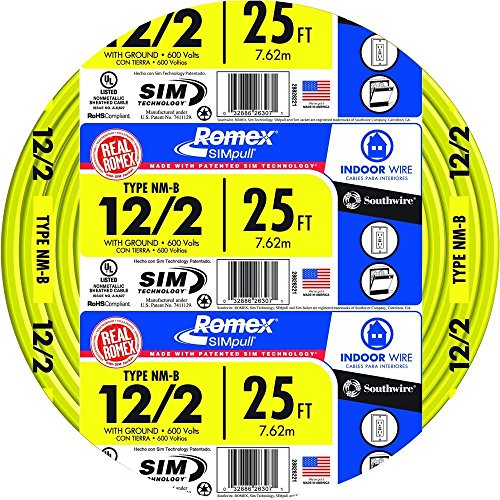
The 12 gauge, 2 conductors with ground, 25' per coil, SIMpull Cable Jacket coated wiring is an excellent choice for residential wiring requirements. The patented SIMpull Cable Jacket coating makes pulling, stripping, and installation of the wire an effortless task. The wire is primarily used for branch circuits meant for outlets, switches, and other loads in residential spaces.
This UL Listed type NM-B wire is manufactured in America and adheres to the highest quality standards. The wire's 25' coil ensures that you can cover a reasonable distance with a single coil. The 12 gauge wire is perfect for providing adequate power supply, while the 2 conductors with ground make it a reliable choice for various applications.
The wire's coating reduces the friction between the wire and the conduit, making it easier to pull, strip, and install. The SIMpull Cable Jacket reduces the chances of damage to the wire, and it also saves time and effort.
2. Simpull Yellow Romex: 50 Ft. Residential Wire
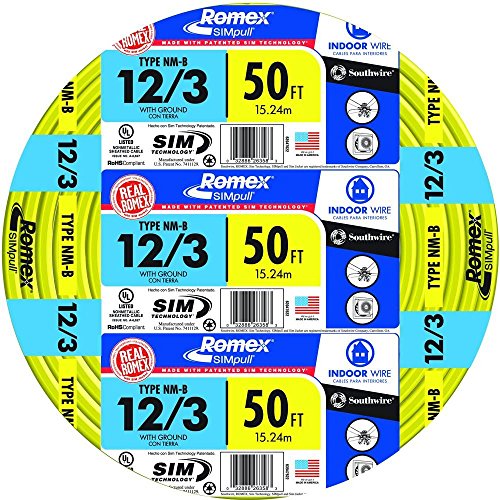
This high-quality electrical wiring is specially designed for residential use and has been coated with the patented SIMpull Cable Jacket, making it incredibly easy to pull, strip, and install. With three conductors and a ground wire, this UL Listed type NM-B wiring is perfect for use as branch circuits for outlets, switches, and other electrical loads.
Each coil of this wiring measures 50 feet in length and is made from durable, top-of-the-line materials in America, ensuring that it will perform reliably and safely for years to come. The 12-gauge wire is thick enough to handle even heavy loads, making it an ideal choice for a wide range of residential wiring applications.
Whether you're a professional electrician or a DIY enthusiast, this high-quality wiring is sure to meet all of your needs. With its convenient coil packaging, it is easy to handle and transport, making it the perfect choice for any residential wiring project. So why wait? Order your coil of this top-quality wiring today and experience the difference for yourself!
3. Yellow Romex Simpull Wire For Indoor Use.
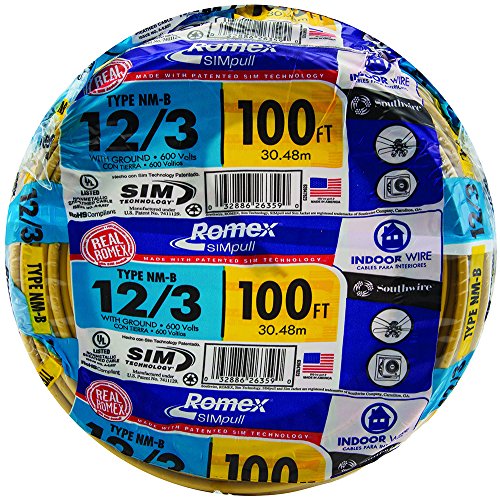
The SIMpull Cable Jacket is a patented solution that makes pulling, stripping, and installation of wiring easier than ever. This particular wiring product is primarily intended for use in residential settings, where it is often used as branch circuits for a variety of loads, such as switches, outlets, and other components.
One of the standout features of this wiring is its UL Listed type NM-B classification, which ensures that it meets strict safety standards for use in homes. Additionally, this wiring comes in a 12 gauge format, with 3 conductors and a ground wire, providing plenty of power and stability for your electrical needs.
Each coil of this wiring measures 100 feet, providing ample wire to complete a variety of projects around the home. And, best of all, this wiring is made in America, ensuring that you are getting a high-quality product that is manufactured with care and precision.
4. Woods 63946822 50' 14-3 Nmw/g Wire, White, 50 Foot
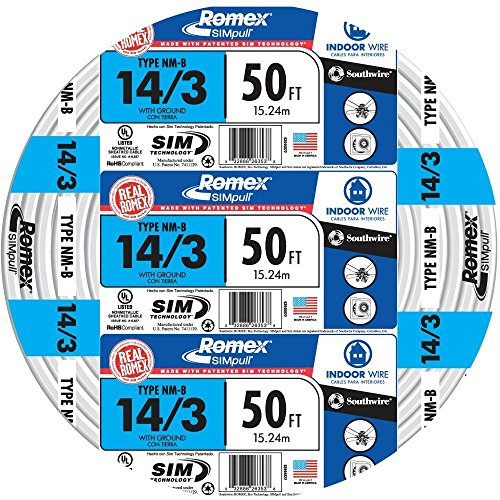
The SIMpull Cable Jacket is a patented technology that makes pulling, stripping, and installation a breeze. This cable is perfect for residential wiring and is used as branch circuits for outlets, switches, and other loads. It is UL Listed as type NM-B, meeting the highest safety standards. The cable comes in a 50' per coil length, with 14 gauge and 3 conductors with ground.
This product is proudly made in America, ensuring the highest quality materials and workmanship. The coated jacket makes it easy to work with and saves time during installation. The UL Listing provides peace of mind that the product meets safety requirements and can be used with confidence.
This cable is a reliable choice for any residential wiring project, whether it's a new construction or a renovation. Its versatility and ease of use make it a popular choice among electricians and DIY enthusiasts. The 14 gauge and 3 conductors with ground provide ample capacity for most applications.
5. Southwire 28829028 100 Ft. 10/2 Solid Romex Simpull Cu Nm-B W/g Wire
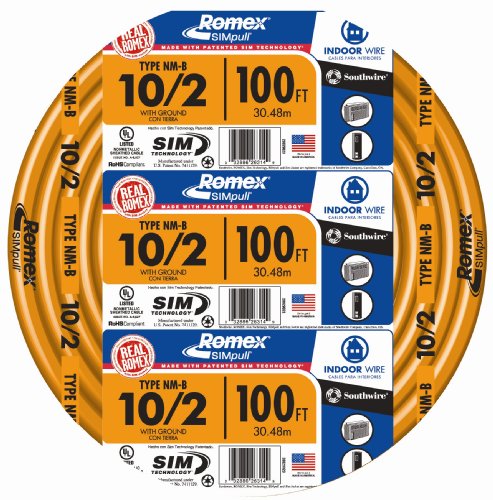
The 10/2WG NMB Wire is an excellent choice for household wiring needs. With a 100 foot roll, this product is perfect for those who need to wire a large area. This wire is designed for above-ground use and is UL approved, ensuring that it meets the highest safety standards.
One of the best things about this wire is that it is made in the USA, so you can trust that you are getting a high-quality product. The uncoated copper conductors provide excellent conductivity, ensuring that your electrical system runs smoothly and efficiently.
Whether you are a professional electrician or a DIY enthusiast, this wire is easy to work with and install. Its parameters and specifications make it ideal for a variety of household wiring needs, including lighting, appliances, and more.
6. Simpull White Indoor Electrical Wire
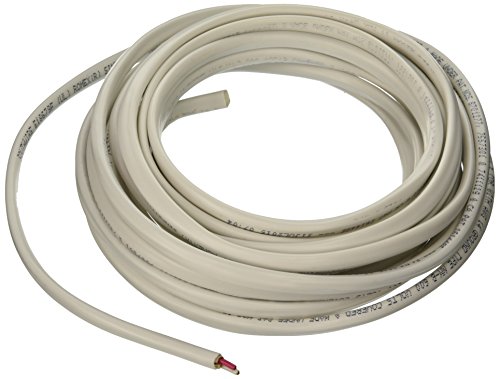
The SIMpull Cable Jacket Coated Electrical Wire is the perfect solution for all your residential wiring needs. It is engineered with a patented jacket that makes it incredibly easy to pull, strip, and install. With this feature, you can save time and effort during installation, and avoid the hassle of tangled wires.
This electrical wire is primarily designed for branch circuits that connect outlets, switches, and other electrical loads. Its durability and reliability make it a popular choice for residential wiring projects. You can trust that this wire will provide a safe and secure electrical connection for your home.
This type NM-B electrical wire is UL Listed, which means it has been tested and certified to meet the highest safety standards. It has undergone rigorous testing to ensure that it can withstand various environmental factors and provide reliable performance.
In addition to its superior performance, this electrical wire is proudly made in the USA. You can trust that it is made with high-quality materials and is built to last. When you choose this wire, you are choosing a product that is not only reliable but also supports American manufacturing.
7. Simpull Residential Indoor Electrical Wire – Orange.
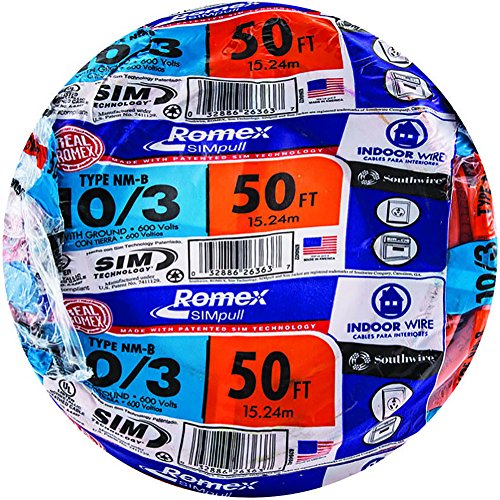
The 10 gauge, 3 conductors with ground, 50' per coil electrical cable is a reliable and efficient option for residential wiring. Its patented SIMpull Cable Jacket makes it easier to pull, strip, and install, saving you both time and effort during your installation process.
This cable is primarily used as branch circuits for outlets, switches, and other loads, making it an essential component of any electrical system. Additionally, the UL Listed type NM-B classification ensures its compliance with safety standards, giving you peace of mind that your electrical system is safe and reliable.
This cable is proudly made in America and features excellent quality, durability, and performance. Its ample length of 50' per coil provides sufficient coverage for most residential wiring projects, making it a cost-effective solution for your electrical system needs.
8. Simpull 10/2 Romex: 50' Residential Wire
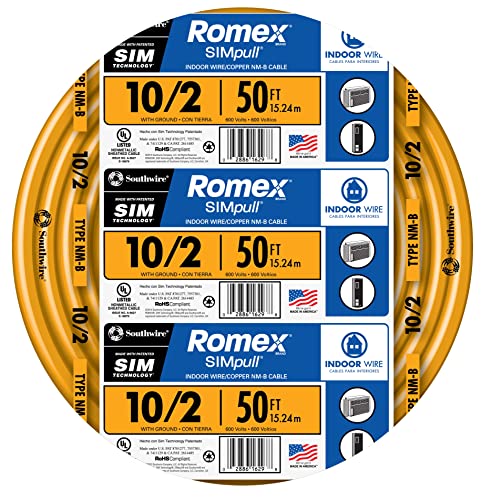
The 10 gauge, 2 conductors with ground NM-B wire is an ideal product for residential wiring purposes. It is widely used for branch circuits that power outlets, switches, and various other loads. The wire is coated with a patented SIMpull Cable Jacket, which makes it easier to pull, strip, and install, ensuring a hassle-free experience for the users.
This wire is UL Listed, which means it has undergone rigorous testing and meets the safety standards. It is available in 50' per coil, which is perfect for small to medium-sized residential wiring projects. The wire is also made in America, ensuring high-quality materials and construction.
The use of this wire provides a reliable and durable solution for residential wiring projects. The 10 gauge wire is suitable for various applications, and the 2 conductors with ground provide a stable connection. Its patented SIMpull Cable Jacket not only ensures an easy installation process but also protects the wire from damages.
9. Woods 63948426 100' 10-3 Nmw/g Wire, Orange, 100 Ft
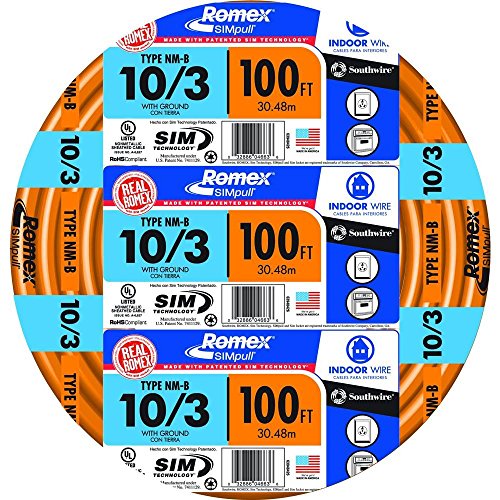
The 10-gauge Southwire SIMpull Cable is an exceptional product designed for easy installation, pulling, and stripping. It is coated with a patented SIMpull Cable Jacket that makes it stand out from other cables. This cable is extensively used in residential wiring as branch circuits for a wide range of loads such as outlets and switches.
This cable is UL Listed type NM-B, and it comes with 3 conductors with a ground. It has a length of 100 feet per coil, which makes it a convenient option for various electrical wiring projects. The Southwire SIMpull Cable is manufactured in America and adheres to all the required standards, making it a reliable and high-quality choice for electrical work.
The patented SIMpull Cable Jacket on this cable makes it easier to handle, and it is designed to reduce friction, making it easy to pull through conduit or stud spaces. This feature also makes it simple to strip, saving time and reducing the risk of damage to the cable.
The Southwire SIMpull Cable is a high-quality product that meets all the required standards for electrical work. It is designed to provide reliable and safe electrical connections, making it an excellent choice for residential wiring projects. Additionally, the cable is made in America, which ensures that it meets all the required quality standards.
10. Southwire 13054226 14/2 Uf W/g Hundred' Wire, Gray, Hundred Ft
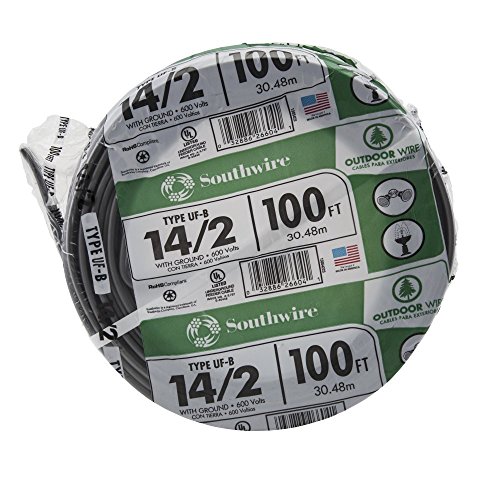
This high-quality electrical wire is designed to withstand a wide range of harsh environmental conditions. It is coated in a sunlight-resistant jacket that is also flame-retardant, ensuring that it can be used safely and reliably in direct burial applications. Whether you need to connect outdoor lighting, apparatus, or other electrical equipment, this wire is up to the task.
The wire is moisture, rust, and corrosion-resistant, making it ideal for use in damp, wet, and corrosive locations. It can be used either in exposed or concealed wiring setups, ensuring that it can be easily integrated into your electrical systems. Additionally, it comes with UL listing, so you can rest assured that it has been thoroughly tested for safety and quality.
This electrical wire comes in a convenient 100-foot coil, with 14-gauge wire and 2 conductors with a ground. This makes it easy to work with and ensures that you have plenty of wire for your project. Best of all, this wire is proudly made in America, so you can support domestic manufacturing while still getting a high-quality product.
Best Electric Wire For Home FAQs
Are there any specific safety precautions I should take when installing electric wire in my home?
Yes, there are several safety precautions you should take when installing electric wire in your home to ensure your safety and the safety of your family. Here are some tips:
1. Turn off the power: Before starting any electrical work, make sure to turn off the power supply to the area you will be working in. This will reduce the risk of electrocution.
2. Use proper tools: Always use the right tools for the job. This will ensure that you can work efficiently and safely.
3. Wear protective gear: When working with electricity, it's important to wear protective gear such as gloves, safety glasses, and a hard hat. This will help protect you from electric shock and other hazards.
4. Use proper wiring: Make sure to use the correct type and size of wiring for your electrical needs. Using the wrong type or size of wire can create a fire hazard.
5. Hire a professional: If you're not comfortable working with electricity, it's best to hire a professional electrician to do the job for you. This will ensure that the work is done safely and correctly.
Can aluminum electric wire be used in a home, and if so, what are the pros and cons?
Aluminum electric wire can be used in a home, but it is not as common as copper wiring. The pros of using aluminum wire include it being less expensive than copper wire and being able to carry more current than copper of the same gauge. However, there are also cons to using aluminum wire. One major issue is that it can be more prone to corrosion, which can cause problems with electrical connections. Additionally, aluminum wire can expand and contract more than copper wire, which can lead to loose connections and potential fire hazards. Furthermore, aluminum wire is not as malleable as copper wire, making it more difficult to work with during installation. If you are considering using aluminum wire in your home, it is important to consult a qualified electrician who can assess your specific needs and provide guidance on the best type of wiring for your situation.
How do I choose the right electric wire for my home's electrical needs?
Choosing the right electric wire for your home's electrical needs is crucial to ensure the safety of your home and family. There are various factors to consider when choosing the right electric wire, such as the wire gauge, insulation, and ampacity.
Firstly, determine the wire gauge based on the amount of current that will flow through the wire. The higher the current, the thicker the wire gauge should be. You can refer to the National Electric Code (NEC) for guidance on the appropriate wire gauge for specific applications.
Next, consider the insulation of the wire. The insulation should be appropriate for the environment and conditions in which the wire will be used. For instance, if the wire will be exposed to moisture or extreme temperatures, choose wire with appropriate insulation, such as THHN wire.
Lastly, consider the ampacity, which is the maximum amount of electrical current a wire can safely handle. Ensure that the chosen wire can handle the amperage required by the electrical circuit it will be used for.
In summary, choosing the right electric wire requires careful consideration of the wire gauge, insulation, and ampacity. Be sure to consult with a licensed electrician if you are unsure about which wire to choose for your specific needs.
How do I properly ground electric wire in my home to prevent electrical shocks?
Grounding electric wire in your home is an important safety measure that can prevent electrical shocks and fires. The first step is to determine if your home's electrical system is grounded or not. You can consult an electrician to check the grounding of your electrical system. If your home is not grounded, it is recommended to install a grounding system.
To ground individual electrical circuits, you can install a grounding wire or conductor that connects to a grounding electrode, usually a metal rod or plate that is inserted into the earth. The grounding wire should be attached to the grounding terminal of the electrical outlet, switch or fixture.
It is important to ensure that all electrical equipment and appliances in your home are grounded. You can check for grounding by using a circuit tester or by consulting an electrician. If you experience any electrical shocks or notice any signs of electrical problems, such as flickering lights or frayed wires, it is important to immediately turn off the power and seek professional help.
In summary, grounding your home's electrical system is an important safety measure that can prevent electrical shocks and fires. If you are unsure about how to properly ground electrical wire in your home, it is recommended to consult with a licensed electrician.
What are the advantages of using copper electric wire in a home?
Copper electric wire is considered to be one of the most widely used materials for electrical wiring in homes due to its numerous advantages. Firstly, copper is an excellent conductor of electricity, which means that it can efficiently deliver electrical power throughout the home, reducing the risk of power loss and energy wastage. Secondly, copper is a highly durable material that can withstand exposure to heat, moisture, and other environmental factors, making it suitable for use in various areas of the home. Additionally, copper is a safe material that does not produce harmful gases or emit toxic fumes, even in the event of a fire. This makes it a reliable and safe choice for electric wiring in homes. Furthermore, copper electric wire is relatively easy to install and maintain compared to other materials. Overall, the use of copper electric wire in a home offers numerous benefits, including safety, durability, energy efficiency, and ease of installation and maintenance.
What is the average lifespan of electric wire used in home installation?
The average lifespan of electric wire used in home installation varies depending on several factors such as the quality of the wire, the environment it is installed in, and how it is used. Generally, copper wiring is known to have a longer lifespan compared to aluminum wiring. The quality of the insulation used on the wire also plays a significant role in determining its lifespan. If the insulation is of high quality and properly installed, the wire can last for several decades. However, if the insulation is of poor quality or gets damaged, the wire can deteriorate quickly and pose a safety hazard. The environment in which the wire is installed also affects its lifespan. For instance, wires installed in damp or wet areas are likely to deteriorate faster than those installed in dry areas. Proper maintenance and regular inspection can help prolong the lifespan of electric wire used in home installation. It is recommended to have a professional electrician inspect the wiring every few years to ensure it is still safe and functional.
What is the best gauge of electric wire for home use?
The best gauge of electric wire for home use depends on various factors such as the amount of current that will flow through the wire, the length of the wire, and the type of appliance or device it will be used for. In general, for standard household wiring, 14-gauge wire is commonly used for 15-amp circuits, while 12-gauge wire is used for 20-amp circuits. However, if the wire will be carrying a heavy load or will be run over a long distance, a thicker gauge wire may be required to prevent overheating and voltage drops.
It is important to note that local building codes and regulations may also dictate the minimum wire gauge required for certain applications. It is always recommended to consult a licensed electrician or a reputable electrical supplier to ensure that the proper wire gauge is selected for your specific needs and to ensure that all safety standards are met.
What is the cost difference between using different types of electric wire for home installation?
The cost difference between using different types of electric wire for home installation can vary based on several factors. The first factor is the gauge or thickness of the wire. Thicker wires can carry more current and are typically more expensive than thinner wires. The second factor is the type of insulation used on the wire. Some insulation materials, such as PVC, are less expensive than others, such as Teflon. Additionally, wires that are designed for specific applications, such as outdoor or underground use, may be more expensive than those designed for indoor use. It is important to note that while cost is a consideration, it is also important to choose the appropriate wire for the intended use to ensure safety and compliance with electrical codes. In general, it is recommended to consult with a licensed electrician to determine the best type of wire for your specific needs and budget.
What is the maximum length of electric wire that can be used in a home without causing voltage drop?
The maximum length of electric wire that can be used in a home without causing voltage drop depends on various factors such as the wire gauge, the amount of current flowing through the wire, and the voltage rating. Generally, for a 120-volt circuit, the maximum allowable voltage drop is 3%. For example, if the voltage at the source is 120 volts, the voltage at the load should not be less than 116.4 volts (120 volts x 0.03).
The length of wire that can be used without causing voltage drop also depends on the wire gauge. Thicker wires have lower resistance and can carry more current without causing voltage drop. For example, a 12-gauge wire can carry up to 20 amps over a distance of 100 feet without causing significant voltage drop, while a 14-gauge wire can carry up to 15 amps over the same distance.
It is important to consult with a licensed electrician or refer to the National Electric Code (NEC) for specific guidelines and requirements for electrical wiring in homes.
Which type of electric wire is the safest for home installation?
When it comes to choosing the safest electric wire for home installation, there are a few factors to consider, such as the wire size, insulation material, and the type of wire. The most commonly used wires for home installation are copper and aluminum wires. Copper wires are preferred for their higher conductivity, durability, and resistance to corrosion. However, aluminum wires are also safe and cost-effective but are less conductive than copper wires.
Another important factor to consider when choosing the safest electric wire for home installation is the insulation material used. The most commonly used insulation materials are PVC, rubber, and thermoplastic. PVC is the most commonly used insulation material due to its high resistance to fire and moisture. Rubber insulation is also safe, but it is not recommended for use in areas with high heat or moisture.
Overall, the safest electric wire for home installation is one that meets the local building codes and safety standards. It is always recommended to hire a licensed electrician to choose and install the electric wires to ensure maximum safety and compliance with regulations.







